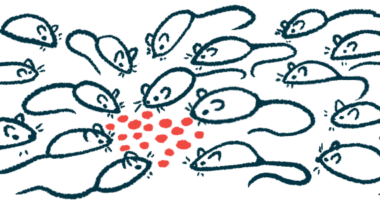Brain organoid study finds MECP2 tied to early nerve cell formation
Lack of protein thwarted precursor cells' transformation into nerve cells

A lack of MECP2 protein, the chief underlying cause of Rett syndrome, prevented precursor cells from transforming into fully mature nerve cells in the early stages of brain development, a study suggests.
Using 3D organoids that mimic the brain, blocking a pathway elevated by MECP2 depletion enhanced the formation of mature nerve cells, data showed.
The findings contribute to understanding the roles of MECP2 in brain development and provide clues about the underlying mechanisms that cause Rett, the researchers said about “MeCP2 dysfunction prevents proper BMP signaling and neural progenitor expansion in brain organoid,” which was published in the Annals of Clinical and Translational Neurology.
Almost all Rett patients carry genetic defects that impair the function of MECP2, a protein that controls the activity of various genes. A lack of MECP2 interferes with the growth, maturation, and connectivity of nerve cells, or neurons and leads to a broad range of neurological symptoms.
Exactly how MECP2 defects disrupt the early development of neurons remains unclear, however, leading researchers in South Korea to grow 3D brain organoids that lacked MECP2 to find out. Grown from human-derived stem cells, these three-dimensional cell structures sum up many of the key Rett-related features in brain development and function.
MECP2 protein’s effect on NPCs
Brain cells are formed step by step from neural stem cells which transform, or differentiate, into neural progenitor cells (NPCs), which differentiate into neurons and other types of brain cells.
After about a month of growth, the researchers noticed that Rett organoids showed a significant depletion of neural rosettes, a flower-like, circular arrangement of NPCs. Neural rosettes are important for forming the neural tube, which gives rise to the brain and spinal cord in embryos.
The expansion of NPCs into different types of brain cells is tightly regulated to ensure the correct number and type of neurons and other cells. A lack of MECP2 suppresses NPC expansion by reducing the production of PAX6, a protein that activates genes involved in NPC progression in early brain development.
“We propose that MeCP2 is required for the formation of neural rosette and maintenance of the NPC pool by mediating PAX6 expression,” the researchers wrote.
Genes related to the bone morphogenetic protein (BMP) pathway — essential for the nervous system’s development and function — were highly associated with MECP2 depletion. In particular, MECP2’s loss caused the early and excessive activation of the BMP signaling pathway, which suppressed NPC expansion.
Treating cells with compounds that blocked the BMP pathway increased the number of neural rosettes, but not their size, indicating a partial rescue of the abnormal processes caused by MECP2’s absence.
Despite these findings, reducing the enhanced BMP pathway in Rett organoids boosted NPC expansion into glutamatergic neurons, nerve cells primarily generated during early brain development that produce glutamate, a key chemical messenger. At the same time, the over-expansion of NPCs to neuron-supporting astrocytes, as seen in Rett organoids, was reduced.
The researchers are proposing a new function of MECP2 in “neural conversion and NPC expansion.”
“Our findings contribute to understanding the roles of MeCP2 in brain development and provide clues about the pathogenic [disease-causing] mechanisms of [Rett] that have been difficult to explain in existing models,” they said.







